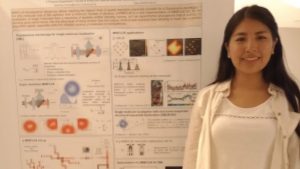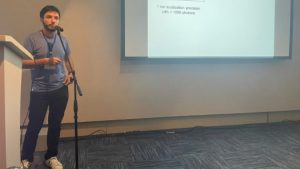Fernando Stefani, director of the Center for Bionanoscience Research (CIBION - CONICET), and Florencia Choque, physicist and PHD candidate in CIBION, attended to the 11th International Weber Symposium on Innovative Fluorescence Methodologies in Biochemistry and Medicine, which was held in Punta del Este, Uruguay, on January 8-13, 2023.
Stefani gave a lecture about one of his fields of research that was titled “RASTMIN, an alternative to MINFLUX that enables nanometre resolution in a laser-scanning (confocal) microscope.”
RASTMIN, also well known as RASTer scanning MINima, is a single-molecule localization method that delivers a localization precision equivalent to MINFLUX but is easily implementable on any laser-scanning (confocal) microscope with few modifications. During his speech, CIBION’s director presented the working principle, simulations, experimental set-up, and performance demonstrations through single-molecule localization measurements and super-resolution imaging of DNA-origami structures.
Furthermore, Choque showed a poster, titled “p-MINFLUX to overcome the sub-10 nm resolution fluorescence nanoscopy”, which is part of her research.

Also, Luciano Masullo, former member of CIBION, presented some research that was done during his stay in CIBION as a PHD candidate.

In addition, it’s important to note that the symposium honors the fundamental and far-reaching contributions of Professor Gregorio Weber. It provides an overview of modern fluorescence methodologies and applications in the biological and medical sciences. During the event, speakers described state-of-the-art and emerging technologies used in their research programs. Topics include time-resolved fluorescence, phasors, Förster resonance energy transfer, multi-photon fluorescence microscopy, confocal microscopy, single molecule studies, fluctuation correlation spectroscopy, fluorescence imaging spectroscopy, macromolecular (nucleic acids and proteins) interactions, membrane dynamics, and quantitative cellular dynamics including metabolism.